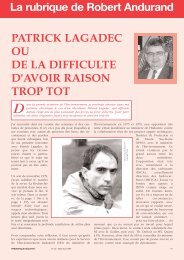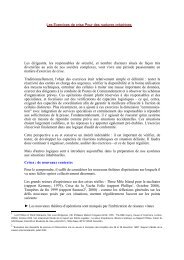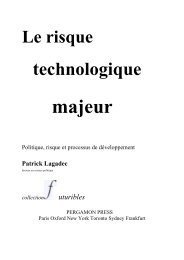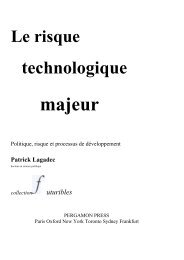- Page 1 and 2:
STATES OF EMERGENCYTechnological Fa
- Page 3 and 4:
viiiContents- Edgar Fasel..........
- Page 5 and 6:
IntroductionIn recent years, a whol
- Page 7 and 8:
Introduction 3And what goes for maj
- Page 9 and 10:
Introduction 5It is not hard to mea
- Page 11 and 12:
Introduction 7Look for example at t
- Page 13 and 14:
PART ONETechnical Breakdown,Crisis
- Page 15 and 16:
12 Technical breakdown, crisis and
- Page 17 and 18:
14 Technical breakdown, crisis and
- Page 19 and 20:
16 Technical breakdown, crisis and
- Page 21 and 22:
18 Technical breakdown, crisis and
- Page 23 and 24:
20 Technical breakdown, crisis and
- Page 25 and 26:
22 Technical breakdown, crisis and
- Page 27 and 28:
24 Technical breakdown, crisis and
- Page 29 and 30:
26 Technical breakdown, crisis and
- Page 31 and 32:
28 Technical breakdown, crisis and
- Page 33 and 34:
30 Technical breakdown, crisis and
- Page 35 and 36:
32 Technical breakdown, crisis and
- Page 38 and 39:
Organizations with their backs to t
- Page 40 and 41:
Organizations with their backs to t
- Page 42 and 43:
Organizations with their backs to t
- Page 44 and 45:
3. In the thick of thingsThe most r
- Page 46 and 47:
MARC BECAMThe oil spill from the
- Page 48 and 49:
M. Becam: The "Amoco Cadiz" 47Trava
- Page 50 and 51:
M. Becam: The "Amoco Cadiz" 49quest
- Page 52 and 53:
M. Becam: The "Amoco Cadiz" 51M. BE
- Page 54 and 55:
M. Becam: The "Amoco Cadiz" 53way:
- Page 56 and 57:
RICHARD THORNBURGHThree Mile Island
- Page 58 and 59:
R. Thornburgh: Three Mile Island 57
- Page 60 and 61:
R. Thornburgh: Three Mile Island 59
- Page 62 and 63:
R. Thornburgh: Three Mile Island 61
- Page 64 and 65:
R. Thornburgh: Three Mile Island 63
- Page 66 and 67:
R. Thornburgh: Three Mile Island 65
- Page 68 and 69:
D.K Burrows: Mississauga 67We chose
- Page 70 and 71:
D .K Burrows: Mississauga 69look af
- Page 72 and 73:
D.K Burrows: Mississauga 71D.K. BUR
- Page 74 and 75:
D.K Burrows: Mississauga 73P.L.: No
- Page 76 and 77:
76 Technological crises and the act
- Page 78 and 79:
78 Technological crises and the act
- Page 80 and 81:
80 Technological crises and the act
- Page 82 and 83:
82 Technological crises and the act
- Page 84 and 85:
EDGAR FASELSchweizerhalleand the po
- Page 86 and 87:
86 Technological crises and the act
- Page 88 and 89:
88 Technological crises and the act
- Page 90 and 91:
PHILIPPE VESSERONThe case of the Se
- Page 92 and 93:
92 Technological crises and the act
- Page 94 and 95:
94 Technological crises and the act
- Page 96 and 97:
96 Technological crises and the act
- Page 98 and 99:
98 Technological crises and the act
- Page 100 and 101:
100 Technological crises and the ac
- Page 102 and 103:
102 Technological crises and the ac
- Page 104 and 105:
104 Technological crises and the ac
- Page 106 and 107:
106 Technological crises and the ac
- Page 108 and 109:
108 Technological crises and the ac
- Page 110 and 111:
Technological crises and the actors
- Page 112 and 113:
Technological crises and the actors
- Page 114 and 115:
114 Technological crises and the ac
- Page 116 and 117:
116 Technological crises and the ac
- Page 118 and 119:
118 Technological crises and the ac
- Page 120 and 121:
120 Technological crises and the ac
- Page 122 and 123:
122 Technological crises and the ac
- Page 124 and 125:
124 Technological crises and the ac
- Page 126 and 127:
126 Technological crises and the ac
- Page 128 and 129:
128 Technological crises and the ac
- Page 130 and 131:
130 Technological crises and the ac
- Page 132 and 133:
132 Technological crises and the ac
- Page 134 and 135:
134 Technological crises and the ac
- Page 136 and 137:
136 Technological crises and the ac
- Page 138 and 139:
138 Technological crises and the ac
- Page 140 and 141:
140 Technological crises and the ac
- Page 142 and 143:
142 Technological crises and the ac
- Page 144 and 145:
144 Technological crises and the ac
- Page 146 and 147:
146 Technological crises and the ac
- Page 148 and 149:
148 Technological crises and the ac
- Page 150 and 151:
150 Technological crises and the ac
- Page 152 and 153:
152 Technological crises and the ac
- Page 154 and 155:
154 Technological crises and the ac
- Page 156 and 157:
156 Technological crises and the ac
- Page 158 and 159:
158 Technological crises and the ac
- Page 160 and 161: 160 Technological crises and the ac
- Page 162 and 163: 162 Technological crises and the ac
- Page 164 and 165: 164 Technological crises and the ac
- Page 166 and 167: 166 Technological crises and the ac
- Page 168 and 169: 168 Technological crises and the ac
- Page 170 and 171: 170 Technological crises and the ac
- Page 172 and 173: LUCIEN ABENHAIMUncertainty, the exp
- Page 174 and 175: 174 Technological crises and the ac
- Page 176 and 177: 176 Technological crises and the ac
- Page 178 and 179: 178 Technological crises and the ac
- Page 180 and 181: 180 Technological crises and the ac
- Page 182 and 183: 182 Technological crises and the ac
- Page 184 and 185: PIERRE BOBE AND JACQUES FOURNIERIn
- Page 186 and 187: 186 Technological crises and the ac
- Page 188 and 189: 188 Technological crises and the ac
- Page 190 and 191: ROBERT L. DILENSCHNEIDEREthics and
- Page 192 and 193: 192 Technological crises and the ac
- Page 194 and 195: 194 Technological crises and the ac
- Page 196 and 197: FRANÇOIS AILLERETAn attitude of op
- Page 198 and 199: 198 Technological crises and the ac
- Page 200 and 201: 200 Technological crises and the ac
- Page 202 and 203: 202 Technological crises and the ac
- Page 204 and 205: 204 Technological crises and the ac
- Page 206 and 207: 206 Technological crises and the ac
- Page 208 and 209: LAURENT FABIUSOur societies: ill-pr
- Page 212 and 213: 212 Technological crises and the ac
- Page 214 and 215: 214Technological crises and the act
- Page 216 and 217: 216 Technological crises and the ac
- Page 218 and 219: 218 Technological crises and the ac
- Page 220 and 221: 220 Technological crises and the ac
- Page 222 and 223: ENRICO QUARANTELLIThirty years of c
- Page 224 and 225: 224 Technological crises and the ac
- Page 226 and 227: 226 Technological crises and the ac
- Page 228 and 229: 228 Technological crises and the ac
- Page 230 and 231: 230 Technological crises and the ac
- Page 232 and 233: PART THREELandmarks for ActionQuest
- Page 234 and 235: 236 Landmarks for action. Questions
- Page 236 and 237: 238 Landmarks for action. Questions
- Page 238 and 239: 240 Landmarks for action. Questions
- Page 240 and 241: 242 Landmarks for action. Questions
- Page 242 and 243: 244 Landmarks for action. Questions
- Page 244 and 245: 246 Landmarks for action. Questions
- Page 246 and 247: 248 Landmarks for action. Questions
- Page 248 and 249: 250 Landmarks for action. Questions
- Page 250 and 251: 6. Perspectives: the debate is open
- Page 252 and 253: Perspectives: the debate is open 25
- Page 254 and 255: Perspectives: the debate is open 25
- Page 256 and 257: Perspectives: the debate is open 25
- Page 258 and 259: Perspectives: the debate is open 26
- Page 260 and 261:
Perspectives: the debate is open 26
- Page 262 and 263:
Perspectives: the debate is open 26
- Page 264 and 265:
Perspectives: the debate is open 26
- Page 266 and 267:
Perspectives: the debate is open 26
- Page 268 and 269:
Perspectives: the debate is open 27
- Page 270 and 271:
Perspectives: the debate is open 21
- Page 272 and 273:
276 Conclusionsituations of excepti
- Page 274 and 275:
ReferencesIntroduction1. P. Lagadec
- Page 276 and 277:
References 281Chapter 21. Newsweek,
- Page 278:
References 28314. Interview with Lu
















